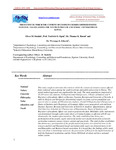The Extent to Which the Content of Common Courses Offered Foster National Values Among the Youth in Private and Public Universities in Kenya.

View/
Date
2016Author
Sindabi, Oliver M.
Ogola, Fredrick O.
Ronoh, Thomas K.
Kikechi, Werunga R.
Metadata
Show full item recordAbstract
This study sought to determine the extent to which the content of common courses offered foster national values among the youth in private and public universities in Kenya. The mixed method approach was employed for the study. The study population comprised of 52,319 university students, 52 Departmental Chairpersons, 4 Deans of Students and 4 Registrars of Academic Affairs at Daystar, Egerton, Baraton and University of Nairobi. A table by Krejcie and Morgan for determining sample size from a given population was used to select a sample of 382 university students. A total 52 Departmental Chairpersons, 4 Deans of Students and 4 Registrars of Academic Affairs were purposively selected from Daystar, Egerton, Baraton and University of Nairobi A Students’ Questionnaire, and an Oral Interview Schedule for Chairpersons of Departments, Deans of Students, and Registrars of Academic Affairs was used to generate the data. Reliability of the instruments was determined through a pilot study where a Cronbach alpha co-efficient of 0.82 was obtained for the students questionnaires. The study established that democracy, participation of the people, equity and social justice were mainly fostered in university curriculum (common courses, lecture content and practicals). The study further established that democracy, participation of the people and social justice were fostered more in the sciences and Art and Humanity based curriculum while equity was fostered more in Art and Humanities and Business based curriculum. It is hoped that, the findings of this study may contribute to knowledge and assist the government of Kenya in the implementation of both the National Constitution, and the Vision 2030 both of which call for a national values system.
